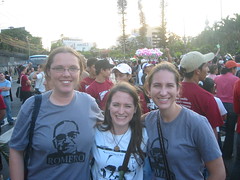Katie, Stephanie, and I had the great privilege of traveling to El Salvador last month as International Election Observers for the presidential election on March 15th. The three of us studied abroad there during college and we were excited to have the opportunity to return. Our experiences in El Salvador had a significant impact on each of us and our understanding of and commitment to social justice.
The right-wing ARENA party in El Salvador has been in power for the last 20 years. ARENA was founded by Roberto D'Aubuisson, who also founded the death squads in El Salvador and was responsible for the assassination of Archbishop Oscar Romero. El Salvador's civil war ended with the Peace Accords in 1992, and during ARENA's time in power since the end of the war, the country has seen little improvement. There is still a huge disparity between rich and poor, the economy is extremely dependent on Salvadorans in the United States sending back remittances, and the country is wracked with violence (now from gangs rather than the military).
During the civil war, the FMLN was the organization of guerrillas fighting against the repressive government. At the end of the war, the group became a formal political party. This year the FMLN candidate, Mauricio Funes, was hugely popular in the polls leading up to the election, and we knew there was a good chance he would win, for the first time in the party's history.
We went to a few different polling places (centros de votación) on election day, and when the polls closed we were at a big polling place in the city of Santa Tecla. The voting process involved quite a few safeguards, including having representatives from both parties seated at each table that was checking IDs against lists of names, handing out the ballots, and tinting voters' fingers with ink. If one party tried to do something wrong, the other party was literally sitting next to them. We heard some reports of fraud – mainly people from outside El Salvador coming and voting with false IDs (most likely hired by ARENA) – but everything we saw went smoothly and according to the rules.
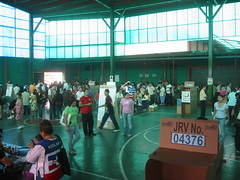
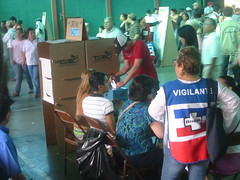
At the end of the day, the doors closed, and the vote count began. Each table had 450 ballots and a list of 450 voters. After counting the remaining ballots and comparing that number to the number of signatures of voters (thumbprints for those who could not sign their names), they sorted and counted the ballots at each table. This election was just for president and vice president, so each ballot had the flags of the two parties (only FMLN and ARENA were running), and the voter needed to draw an X on their party of choice.
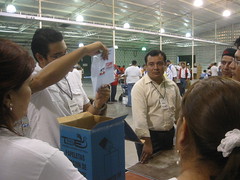
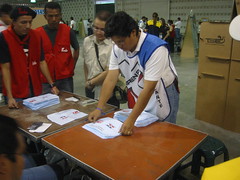
As tables began finishing their counts, we heard cheer after cheer from the FMLN. It became clear that Funes had won at our polling place. We went out into the parking lot where some staunch FMLN friends were listening to results on the radio. Reports from other locations made it clear that Funes was winning in other places as well.
For the first time in Salvadoran history, the country would have a leftist president. We took off our election observer badges (which required that we be neutral), put on FMLN t-shirts that were handed to us, and went out into the streets where people were celebrating. It was a beautiful sea of red shirts and hats and flags and so much joy. It was moving to hear the chant "El pueblo unido jamás será vencido" – the people united will never be defeated. We were with people who were forced to leave El Salvador during the war because otherwise they would have been killed, people who had fought with the guerrillas for the entire war, and people who had simply suffered greatly under the Salvadoran government. It was clear that it was a bittersweet moment for many people – great joy at an FMLN victory after all those years, but sorrow in remembering all the people who fought to achieve it but never lived to see it.
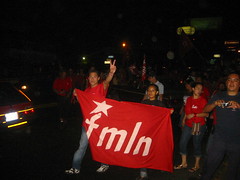
It was an honor to witness this historic event in solidarity with the people of El Salvador. While it felt like we didn't do much, multiple people expressed their appreciation of us being there and said that our solidarity was very important. After reflecting on all the pain that the United States has caused El Salvador, sending millions of dollars daily to the Salvadoran military that raped, tortured, and massacred people for organizing, speaking out, or simply being poor, the importance of solidarity from the U.S. became clearer to me. The U.S. still has a lot of power over El Salvador, and, just like during the war, our actions and decisions can have a great impact on the country, for good or for bad, which is why it is so important that we stand in solidarity with the people of El Salvador.
It is hard to tell what changes President-elect Funes will bring, and we don't really know if he will be a good president, but we do know that for once the left has been given the opportunity to make changes in the interest of the poor people of El Salvador that ARENA never did. In his acceptance speech, Funes specifically mentioned the preferential option for the poor and his desire to be a president for social justice. When I asked Salvadorans what they thought of Funes, if they thought he would do a good job, they usually just said that they hoped so. They hoped that he would bring about change that they so badly want and need.
After the election, we spent the week meeting with people; visiting places like the University of Central America (UCA), where six Jesuit priests and two women were brutally murdered in 1989 (also where we ran into liberation theologian Jon Sobrino, which almost made Katie faint in excitement), and the Cathedral where Monseñor Romero is buried; and spending time with old and new friends from our study abroad program. It was a great joy to spend this week in El Salvador, and we are very grateful to all those who gave donations and prayers to our cause.
